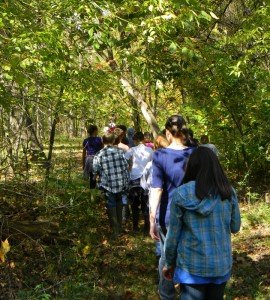 Linton Hall students walk through the woods as part of their OCEW studies.
Linton Hall students walk through the woods as part of their OCEW studies.By Stacy Shaw
At Linton Hall School in Bristow, students have been engaging in an experiential ecology curriculum for nearly 40 years, utilizing their 100-plus acre campus and teaching students about conservation, stewardship and sustainability. The program is known as Outdoor Conservation, Ecology and Wildlife (OCEW).
Through the OCEW program, Students in grades K-4 are participating in a wide range of fieldwork projects that have taken them outside the school building, studying the natural environment, collecting data and conducting experiments, such as tracking animals and testing creek water up and down stream; while upper grades are working on long-term sustainability projects.
“This is the first year we’ve worked with Bull Run Mountain Conservancy (BRMC),” said Assistant Head of School, Archie Catalfamo, explaining that the Conservancy group, “really helped us grasp the potential of this campus.”
Volunteers from the BRMC take the younger children into the natural environment to conduct fieldwork. Back in class, teachers lead the children in reflection and incorporate their experiences in multi-faceted lessons and activities.
Catalfamo believes it’s a great way to take advantage of their idyllic Bristow location and to help the children better understand the interaction between micro and macro ecosystems.
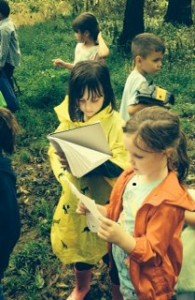 Young Linton Hall Students look at their notes, while on a science expedition with Bull Run Mountain Conservancy.
Young Linton Hall Students look at their notes, while on a science expedition with Bull Run Mountain Conservancy.“Our actions impact how we directly affect this community,” Catalfamo said. “[It’s about] their environment, their individual actions, and how they grow and expand.
As a ministry of the Benedictine Sisters of Virginia, a Linton Hall School education embraces the Ten Benedictine Values. The value of Stewardship is defined as “respect the beauty and goodness of creation.” Stewardship is emphasized in the OCEW program as it fosters awareness that we are part of a larger ecology and that the environment – human as well as non-human – has been given by God for the sake of all.
At Linton Hall School, Catalfamo said they pride themselves on putting stewardship into action.
Meanwhile, upper-grade students at Linton Hall School are taking a more long-range approach to their ecology lessons, working on long-term projects through Outdoor Conservation Education & Wildlife.
Currently, seventh and eighth-grade students are in the process of building a chicken coop that will house four chickens on the Linton Hall School campus.
Taking an interdisciplinary approach, Science teacher Margaret Mason, who is overseeing the OCEW projects, began by having students research the best design for the coop. Then, students created a project proposal, including cost-analysis and logistical considerations, which they presented to the Benedictine Sisters who own and operate the campus.
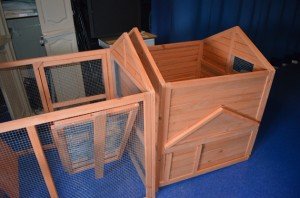 Building a chicken coop. and raising chickens is a part of the 7th-8th-grade long term science project.
Building a chicken coop. and raising chickens is a part of the 7th-8th-grade long term science project.Mason said this is the first year the school has engaged in a project-based curriculum rather than smaller stand-alone activities. She chose projects that tie into the curriculum: eighth-grade physical science and seventh-grade life science, but also ones that had a practical, real-world approach and would motivate the students.
Knowing, that the seventh-grade class hatches chicks in the spring, creates excitement throughout the student body, Mason thought, “How about if this spring, we hatch and give them to a foster family to take care of them until September rolls around.”
If all goes according to plan, the school will get back four young chickens in the fall. Seventh and eighth-grade students will then share in the responsibility of caring for them.
Even as students are just moving beyond the construction phase of the project, Mason said the students have been really responsive.
“They get really excited. Can we take some of our science time to come out and work on it, so they’re eager, especially the seventh grade because they are going to see it next year,” Mason said.
She told her eighth-grade students that the chicken coop will remain years after they graduate, saying, “You’ll know that you were a part of that.”
Next year, Mason expects the chickens will yield fresh eggs that they can serve in the cafeteria salad bar.
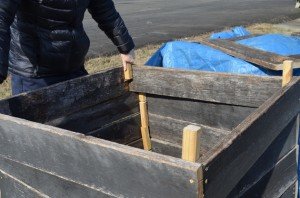 The 5th and 6th-grade students have built a compost bin to use on campus.
The 5th and 6th-grade students have built a compost bin to use on campus.Mason’s fifth and sixth-grade students are also participating in long-term OCEW projects, building a composting bin and, later in the year, a small greenhouse.
The project is encouraging more sustainable behaviors that have already reverberated throughout the school community. In the cafeteria, all students are separating their waste, so used food scraps go into the compost bin.
Compost will be used to fertilize the soil in the greenhouse. Soon, fifth and sixth-grade students will grow fresh vegetables that will be served in the cafeteria. Some of those scraps will surely end up back in the compost, completing the cycle of sustainability.
The projects fit in nicely with their general science and earth science curriculum, and more importantly, it also teaches the students stewardship.
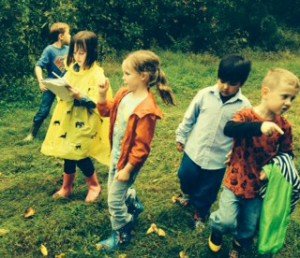 Students learn about stewardship as they conduct fieldwork on the 100-acre plus Bristow campus.
Students learn about stewardship as they conduct fieldwork on the 100-acre plus Bristow campus.To Catalfamo, this is an important distinction that sets Linton Hall School apart in its holistic approach to learning.
“ constantly being reinforced. Eventually, it gets to a point where it sticks and it becomes part of who they are. This is why Linton Hall School is so special; why the students who graduate are so special. They’ve got those values.”
Linton Hall School is holding an Open House on Sunday, Jan. 31 at 1 p.m. Linton Hall School is located at 9535 Linton Hall Road in Bristow. Readers interested in learning more about Linton Hall School can call 703-368-3157.
Photos of the children interacting with nature were submitted by the administration at Linton Hall Schools.
Support Bristow Beat - Donate Today!